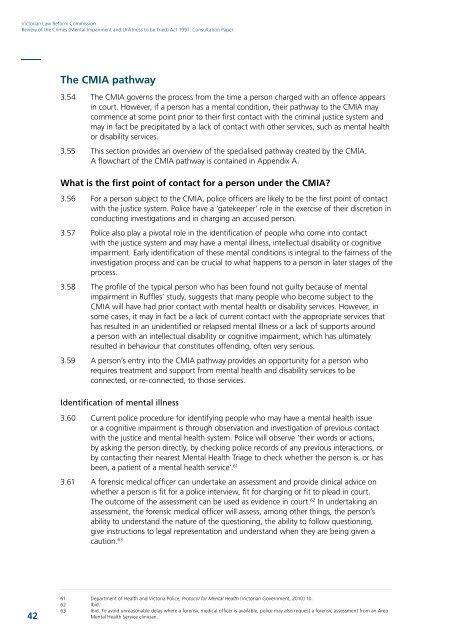Crimes Mental Impairment consultation paper.pdf - Victorian Law ...
Crimes Mental Impairment consultation paper.pdf - Victorian Law ...
Crimes Mental Impairment consultation paper.pdf - Victorian Law ...
You also want an ePaper? Increase the reach of your titles
YUMPU automatically turns print PDFs into web optimized ePapers that Google loves.
<strong>Victorian</strong> <strong>Law</strong> Reform Commission<br />
Review of the <strong>Crimes</strong> (<strong>Mental</strong> <strong>Impairment</strong> and Unfitness to be Tried) Act 1997: Consultation Paper<br />
The CMIA pathway<br />
3.54 The CMIA governs the process from the time a person charged with an offence appears<br />
in court. However, if a person has a mental condition, their pathway to the CMIA may<br />
commence at some point prior to their first contact with the criminal justice system and<br />
may in fact be precipitated by a lack of contact with other services, such as mental health<br />
or disability services.<br />
3.55 This section provides an overview of the specialised pathway created by the CMIA.<br />
A flowchart of the CMIA pathway is contained in Appendix A.<br />
What is the first point of contact for a person under the CMIA<br />
3.56 For a person subject to the CMIA, police officers are likely to be the first point of contact<br />
with the justice system. Police have a ‘gatekeeper’ role in the exercise of their discretion in<br />
conducting investigations and in charging an accused person.<br />
3.57 Police also play a pivotal role in the identification of people who come into contact<br />
with the justice system and may have a mental illness, intellectual disability or cognitive<br />
impairment. Early identification of these mental conditions is integral to the fairness of the<br />
investigation process and can be crucial to what happens to a person in later stages of the<br />
process.<br />
3.58 The profile of the typical person who has been found not guilty because of mental<br />
impairment in Ruffles’ study, suggests that many people who become subject to the<br />
CMIA will have had prior contact with mental health or disability services. However, in<br />
some cases, it may in fact be a lack of current contact with the appropriate services that<br />
has resulted in an unidentified or relapsed mental illness or a lack of supports around<br />
a person with an intellectual disability or cognitive impairment, which has ultimately<br />
resulted in behaviour that constitutes offending, often very serious.<br />
3.59 A person’s entry into the CMIA pathway provides an opportunity for a person who<br />
requires treatment and support from mental health and disability services to be<br />
connected, or re-connected, to those services.<br />
Identification of mental illness<br />
3.60 Current police procedure for identifying people who may have a mental health issue<br />
or a cognitive impairment is through observation and investigation of previous contact<br />
with the justice and mental health system. Police will observe ‘their words or actions,<br />
by asking the person directly, by checking police records of any previous interactions, or<br />
by contacting their nearest <strong>Mental</strong> Health Triage to check whether the person is, or has<br />
been, a patient of a mental health service’. 61<br />
3.61 A forensic medical officer can undertake an assessment and provide clinical advice on<br />
whether a person is fit for a police interview, fit for charging or fit to plead in court.<br />
The outcome of the assessment can be used as evidence in court. 62 In undertaking an<br />
assessment, the forensic medical officer will assess, among other things, the person’s<br />
ability to understand the nature of the questioning, the ability to follow questioning,<br />
give instructions to legal representation and understand when they are being given a<br />
caution. 63<br />
42<br />
61 Department of Health and Victoria Police, Protocol for <strong>Mental</strong> Health (<strong>Victorian</strong> Government, 2010) 10.<br />
62 Ibid.<br />
63 Ibid. To avoid unreasonable delay where a forensic medical officer is available, police may also request a forensic assessment from an Area<br />
<strong>Mental</strong> Health Service clinician.

















